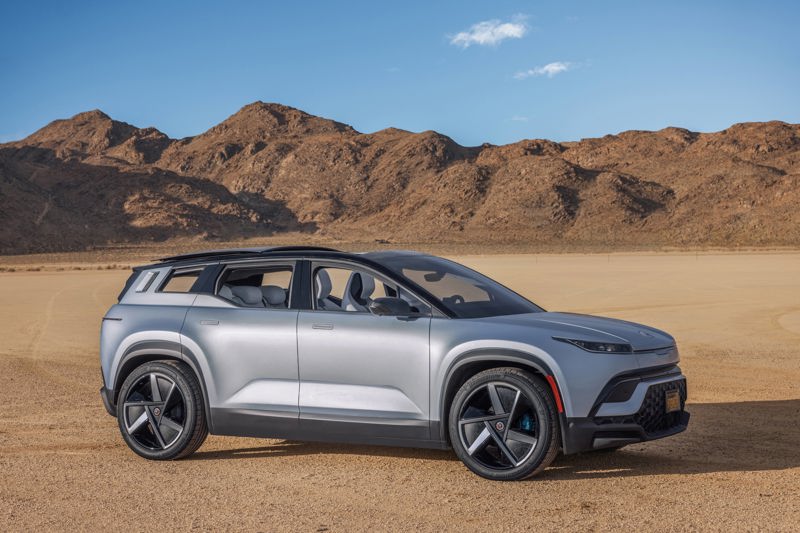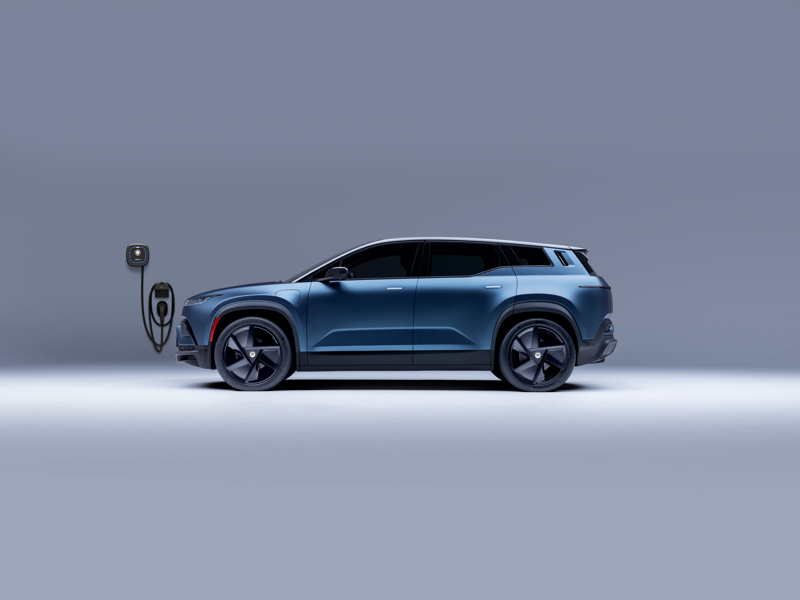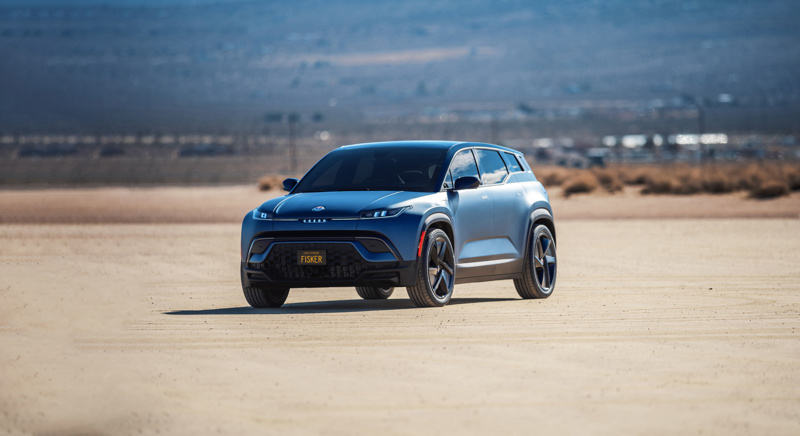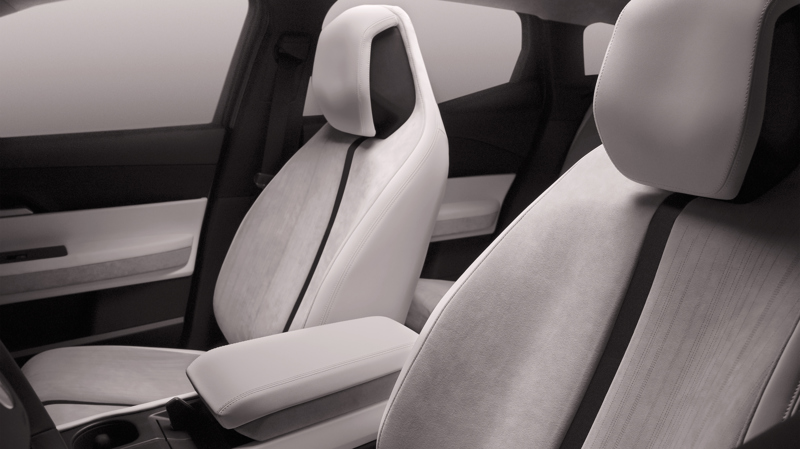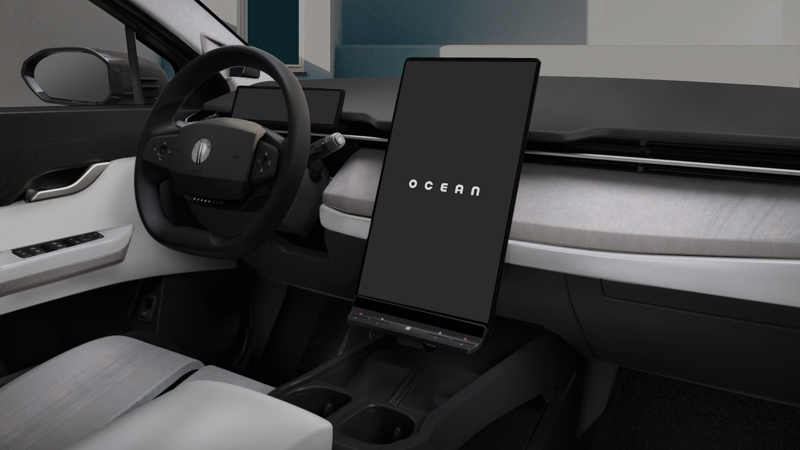Fisker Ocean Extreme
Fisker Ocean Extreme is an all-electric SUV offering a WLTP range of up to 707 km (439 miles). EVKX.net has all the details you need.
Fisker Ocean Extreme
We've organized this article into specific sections for easier navigation. Click the links below to jump to different areas or read on for the full article. Additionally, we offer an overview of the full specifications, an image gallery, detailed information about charging performance, and some online reviews. Our sections include:
- Performance
- Battery, Range, and Charging
- Drivetrain (suspension, brakes, and steering)
- Exterior (paint colors, wheels, and more)
- Interior (seating and features)
- User interface and controls
- Infotainment system
- Lighting Systems
- Advanced Driver Assistance Systems (ADAS)
- Cargo Space and Towing
Performance
The Fisker Ocean Extreme delivers impressive performance with a maximum power of 415 kW (564 hp / 557 bhp) when using overboost. Without overboost, it still offers a robust 344 kW (468 hp / 461 bhp). The vehicle generates a maximum torque of 737 Nm (544 lb-ft), enabling it to accelerate from 0 to 100 km/h (0 to 62 mph) in just 4 seconds and reach a top speed of 205 km/h (127 mph).
Battery, Range, and Charging
The high-capacity battery has a gross capacity of 113.0 kWh and a net usable capacity of 106.5 kWh, providing a 6.5 kWh buffer (5.8%) for battery protection. With a nominal voltage of 380 volts, the system is classified as a 400-volt battery system, aligning with industry standards.
This Lithium-Ion battery utilizes NMC (Nickel Manganese Cobalt) technology.
Under the WLTP (Worldwide Harmonized Light Vehicles Test Procedure) standard, the vehicle's range varies between 707 to 701 km (439-436 miles), depending on the specific configuration and options, such as wheel size. Larger wheels can increase energy consumption and subsequently reduce the overall range. The vehicle's energy consumption is rated at 15.1 kWh/100 km for the base model and 15.2 kWh/100 km for the top-tier model under the WLTP test cycle.According to the WLTP (Worldwide Harmonized Light Vehicles Test Procedure) standard, the vehicle's range is 707 km (439 miles), with an energy consumption rate of 15.1 kWh/100 km (3 mi/kWh). For more details about the range, see real-world data and range listings on this model’s range and consumption page.
The vehicle supports fast DC charging with a maximum power of 170 kW. Charging from 0% to 100% takes approximately 79 minutes, while a typical 10% to 80% charge takes about 39 minutes with an average charging speed of 114 kW. Considering an additional 5 minutes for each charging stop due to driving interruptions, the optimal charging range is from 2% to 46%. This results in an effective charging speed, including time lost, of 113 kW, with each charging session taking about 25 minutes and 47 seconds.
In a 1000 km challenge at a constant speed of 120 km/h (75 mph) with an assumed consumption rate of 29 kWh/100 km, the trip would take about 9 hours and 58 minutes, needing three charging stops from 2% to 60%, totaling 98 minutes of charging time.
Onboard Charger
The standard onboard charger supports up to 11 kW for Level 1 and Level 2 AC charging, allowing a full 0–100% charge in about 9 hours and 40 minutes with a standard home setup.
Fisker Ocean Extreme
Charge Port
The location of the charge port is on the left front side. This location makes it easy to charge stations where you park side into the charger.
Connector types vary by market: this model uses CCS Combo 1 in North America and CCS Combo 2 in Europe. For complete specifications for all markets, refer to the full specifications.
Drivetrain
The Fisker Ocean Extreme features an all-wheel drive system powered by two motors, one on each axle.
Suspension
The front suspension is MacPherson Strut, and the rear suspension is Multilink. The standard suspension includes steel springs and hydraulic dampers.
The standard suspension has a fixed height and damping characteristics.
Ground clearance with this setup is 165 mm.
Drive Modes
The Fisker Ocean Extreme lets the user select different drive modes that affect the car's handling.
The driver can choose between 4 modes:
- Earth: Balanced steering, efficient throttle, and strong lift-up regen.
- Fun: Balanced steering, balanced throttle, and medium lift-up regen.
- Hyper: Balanced steering, dynamic throttle, and medium lift-up regen.
- Snow/Ice: Balanced steering, efficient throttle, and low lift-up regen.
Brakes
The Fisker Ocean Extreme is equipped with cast-iron disc brakes on both the front and rear.
Regenerative Braking
Automatic regeneration is not available in this model. However, regenerative braking is available through one-pedal driving combined with blended brakes.
However, it is not considered full one-pedal driving since, at low speeds, the vehicle will keep rolling until it comes to a stop by itself.
Drivers can also adjust the regenerative braking strength when lifting off the accelerator. There are three levels of regenerative braking to choose from, allowing you to customize the driving experience to your preference.
Exterior
The Fisker Ocean Extreme, with dimensions of 4774 mm in length, 1982 mm in width, and 1631 mm in height, falls into the Compact SUVs category, also known as C-SUVs. These offer a balance between the practicality and maneuverability of smaller vehicles and the space and versatility of larger SUVs.
The Fisker Ocean Extreme is available in a total of 12 paint colors, including several striking metallic options.
The Fisker Ocean Extreme offers multiple wheel options in different sizes, allowing you to customize your vehicle to suit your style and driving preferences. The available tire and wheel combinations include:
- 255/50 tires on 20" rims
- 255/45 tires on 22" rims
Narrower wheels improve consumption and provide a longer range, while wider wheels offer better traction and handling.
The car has four regular doors and a hatchback-style liftgate.
There is only one roof option for this model.
The standard roof has a panoramic roof. The glass extends most of the roof, and occupants can open the front part. This glass makes the car’s interior feel more spacious and bright, which can improve the mood and comfort of the occupant. The glass is toned to protect against heat from the sun.
Fisker Ocean Extreme
Interior
There is one seat type you can select in different materials.
Seats
The Fisker Ocean Extreme accommodates five passengers with two front seats and a three-seat bench in the rear.
First Row Seats
The Fisker Ocean Extreme offers a single type of front seat.
The following functionalities are available on the standard seat:
- Fore-and-aft adjustment (electrically adjustable)
- Recline adjustment (electrically adjustable)
- Seat cushion angle adjustment (electrically adjustable)
- Heating
- Memory
Available in:
- Black fabric upholstering
- Black leatherette upholstering
- Blue microfiber/leatherette upholstering
- Beige microfiber/leatherette upholstering
Fisker Ocean Extreme
Second Row Seat
The second row features a standard three-seat bench with a 40:20:40 split, allowing each section to fold separately to increase cargo space.
Additional functionalities include:
- Recline adjustment (manually adjustable)
- Heating (standard for outer seats)
Climate System
There is one climate system available:
- 2-zone climate system: Supports different temperatures for the driver and passenger.
A standard heat pump is included, which can save significant energy that the EV would otherwise use for heating in cold weather.
Comfort Features
The Fisker Ocean Extreme includes several features to enhance comfort and convenience:
- Easy Entry Function: Moves the driver seat to facilitate easier entry into the car.
- Wireless Phone Charging
User Interface and Control
The control interface of the Fisker Ocean Extreme is primarily screen-based, with minimal use of physical buttons or stalks. This streamlined design emphasizes digital interaction but may compromise ease of use for some drivers who prefer tactile controls.
This model features a dual-screen configuration, with a dedicated digital instrument cluster for the driver and a central infotainment display integrated into the center console.
Key screen details:
- Driver Information Display: A 10.2-inch screen integrated into the dashboard behind the steering wheel. It provides essential driving data such as speed, range, and navigation prompts.
- Center Console Touchscreen: A 17.1-inch touchscreen located in the center console. It serves as the primary interface for infotainment, navigation, climate control, and vehicle configuration.
The Fisker Ocean Extreme does not include a head-up display, so driving information such as speed and navigation cues is not projected into the driver’s line of sight on the windshield.
Fisker Ocean Extreme
Steering Wheel
The Fisker Ocean Extreme is equipped with a single type of steering wheel:
- Circular Steering Wheel: This steering wheel provides intuitive control over the infotainment system, allowing you to easily adjust the volume, change music tracks, and manage other key functions.
Mirrors
Both the exterior and interior mirrors use conventional mirror technology to provide a clear view of the area behind the vehicle.
This model comes equipped with voice control as standard, allowing you to manage various functions through voice commands.
Infotainment
Navigation System
With the common.standardfeature in-car navigation system, you have all the assistance you need to reach your destination effortlessly.
Sound System
The Fisker Ocean Extreme comes equipped with one sound system option:
- Fisker Hypersound 3D: Features en 16 speakers and delivers a maximum output of 500 watts.
Additionally, the model includes 3 USB-C connections as standard.The model has 1 USB-A connections as standard.
Mobile App
The Fisker Ocean Extreme comes with a dedicated mobile app, available for both Android and iOS devices, allowing you to manage and monitor your vehicle remotely. The app offers a wide range of features designed to enhance your driving experience:
Lights
Standard Headlights: These use advanced LED technology, providing bright and efficient illumination.
The taillights use LED technology, ensuring both high visibility and energy efficiency.
Advanced Driver Assistance Systems
The Fisker Ocean Extreme features a range of standard and optional advanced driver assistance systems (ADAS) designed to enhance safety and comfort.
Efficiency Assist: A Standard feature that helps drivers anticipate driving conditions and conserve energy.
Safety Systems
Anti-lock Braking System (ABS): Standard on the Fisker Ocean Extreme, this system prevents the wheels from locking during braking.
Electronic Stability Control (ESC): Standard on the Fisker Ocean Extreme, this system improves the vehicle's stability and handling during sudden maneuvers or on slippery road conditions.
Lane-Keeping Assist (LKA): Standard on the Fisker Ocean Extreme, this system helps prevent the vehicle from drifting out of its lane.
It also includes a Lane Departure Warning system to alert the driver if the vehicle veers out of the lane.
Forward Collision Warning (FCW): Standard on the Fisker Ocean Extreme, this driver assist system helps drivers avoid or mitigate frontal collisions.
Automatic Emergency Braking (AEB): Standard on the Fisker Ocean Extreme, this system autonomously applies the brakes to prevent or reduce the severity of a collision if the driver does not react in time.
Automatic Emergency Steering (AES): Standard on the Fisker Ocean Extreme, this system assists in avoiding collisions by automatically steering the vehicle in an emergency.
Blind-spot Monitoring (BSM) : Standard on the Fisker Ocean Extreme, this side assist system helps to detect traffic in blind spots.
Exit Warning: Standard on the Fisker Ocean Extreme, this system alerts occupants if there is a risk of opening a door into an oncoming object or person if there is a risk of hitting something.
Driving Automation
With the standard Fisker Intelligent Pilot level 2 system, you get the following driving automation features.
- Adaptive Cruise Control (ACC)
- Lane Centering Assist (LCA) /AutoSteer: keeps the car in your lane and slows down if needed in traffic. The system limits how long you can drive without touching the steering wheel.
- Automatic parking.
Safety
Security and Access Technologies
The Fisker Ocean Extreme is equipped with advanced security features to protect you and your vehicle. These include:
- Keyless Entry and Start: The vehicle's keyless entry and start system enables seamless access, allowing you to unlock and start the car without needing to remove the key from your pocket or bag.
Cargo Capacity and Towing Ability
The trunk offers a cargo capacity of 476 liters (16.8 CU FT). With the rear seat folded down, this expands to 918 liters (32.4 CU FT).
On the roof, you can load up to 75 kg (165.3 lbs).
The vehicle’s maximum weight is 2974 kg (6557 lbs), with a base weight of 2433 kg (5364 lbs). This allows for a maximum load of 541 kg (1193 lbs), including the driver and passengers. Note that some options may increase the base weight and reduce the maximum loading capacity.
A towbar can be added to the vehicle. The maximum permissible weight for a braked trailer is 1820 kg (4012 lbs), while for an unbraked trailer, it is 750 kg (1653 lbs).
Availability & Pricing
Alternative Models
In the rapidly expanding EV market, EVKX.net has identified several alternatives to the Fisker Ocean Extreme that are worth considering based on features, specifications, and pricing.
Most sold EVs in World
The following list shows the most sold EVs in World in 2024.
- Tesla Model y
- BYD Seal U
- Tesla Model 3
- BYD Seagull
- BYD Qin Plus
- BYD Atto 3
- Wuling Hongguang Mini EV
- BYD Han

